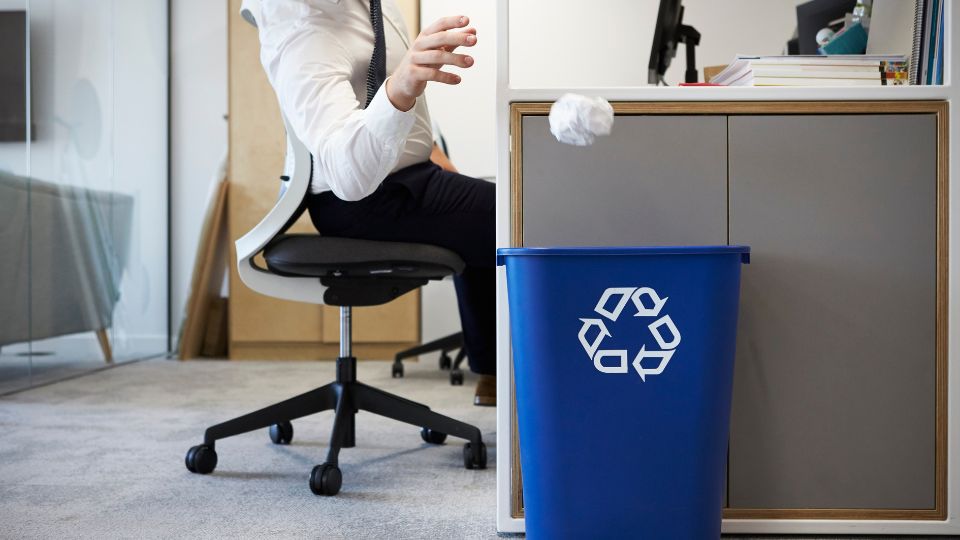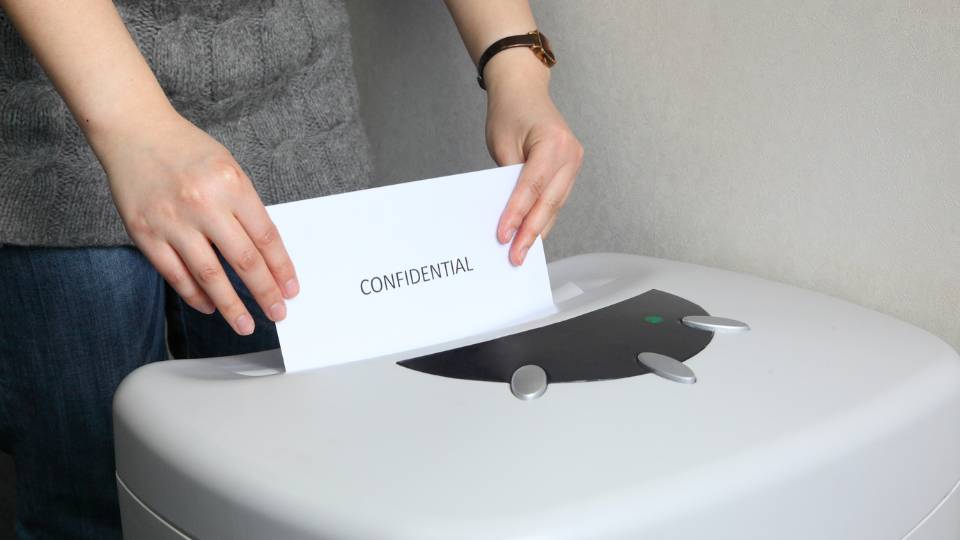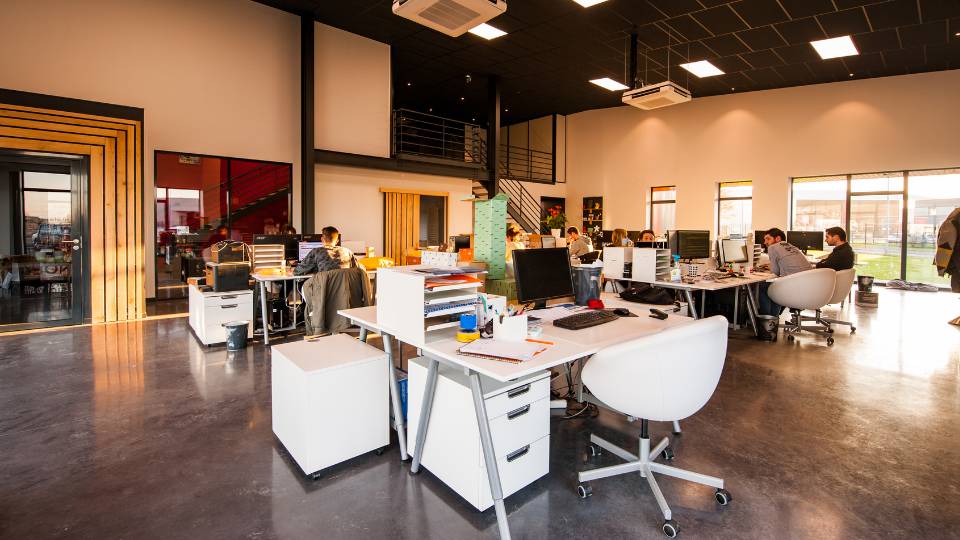
With more and more employees embracing eco-conscious waste management now is more important than ever to promote recycling in the workplace.
It’s not just a responsibility for our homes; it extends to our workplaces as well. By adopting recycling habits at work, we can significantly reduce our ecological footprint, conserve resources, and contribute to a more sustainable future.
In this blog post, we’ll explore practical tips and strategies to implement an effective recycling program in the workplace, with a focus on the United Kingdom.
Let’s dive in and discover how various industries, including retail, offices, construction, small stores, and e-commerce, can make a positive impact through recycling.
Table of contents
- Top tips for recycling in the workplace
- How to promote recycling in the workplace for Retail
- How to Promote Recycling in the Workplace for Offices
- How to promote Recycling in Construction
- Recycling in Small Stores
- Promoting Recycling in E-commerce Workplace
- Workplace Recycling Statistics UK
- Conclusion
Top tips for recycling in the workplace
Recycling in the workplace is an excellent way to reduce waste and promote sustainability. Here are some top tips for recycling in the workplace.
- Provide Recycling Bins: Place clearly labelled recycling bins throughout the workplace in convenient locations, such as near desks, break rooms, and copy/printing areas. Ensure that bins are easily identifiable for different types of materials like paper, plastic, glass, and aluminium.
- Reduce Paper Usage: Encourage digital documentation and communication to minimise paper usage. Print only when necessary and promote double-sided printing. Use electronic formats for internal memos, reports, and other documents whenever possible.
- Go Paperless for Meetings: Instead of distributing paper handouts or agendas, encourage employees to bring their own devices or provide digital copies of meeting materials. This reduces paper waste and encourages a more sustainable approach to meetings.
- Recycle Electronic Waste (E-Waste): Establish a process for collecting and recycling electronic waste, such as old computers, printers, and batteries. Partner with an e-waste recycling organisation or local recycling centre to ensure proper disposal of these items.
- Provide Recycling Guidelines: Clearly communicate recycling guidelines to employees through signage, emails, or internal newsletters. Include information on what can be recycled, where to find recycling bins, and any specific instructions for recycling certain materials.
- Engage Employees: Encourage employees to actively participate in recycling efforts. Consider establishing a green team or sustainability committee to drive recycling initiatives, organise educational campaigns, and monitor progress.
- Offer Incentives: Create incentives to motivate employees to recycle. For example, recognise and reward departments or individuals who consistently practice good recycling habits. Consider implementing a friendly competition or offering small incentives like gift cards or recognition certificates.
- Partner with Recycling Services: Collaborate with local recycling services to ensure effective and responsible recycling practices. They can help provide recycling bins, offer guidance on best practices, and assist with recycling collection and processing.
Read our blog on the importance of recycling in the workplace!
How to promote recycling in the workplace for Retail
The retail industry plays a vital role in recycling efforts. Consider these statistics to promote recycling in the workplace at your business:
- Assess current recycling practices: Begin by evaluating the existing recycling practices in your workplace. Determine the types of materials being discarded and identify any recycling programs already in place. This assessment will provide a baseline for improvement.
- Set recycling goals: Establish clear and measurable goals for recycling in your workplace. For example, aim to increase the recycling rate by a certain percentage or reduce the amount of waste sent to landfills by a specific amount. These goals will help guide your efforts and track progress.
- Educate employees: Raise awareness among your employees about the importance of recycling and its impact on the environment. Conduct training sessions or workshops to provide information on the benefits of recycling and how to correctly separate recyclables from regular waste.
- Provide convenient recycling stations: Make recycling easy and convenient for employees by placing clearly labelled recycling bins in strategic locations throughout the workplace. Ensure that bins are easily accessible and clearly indicate what materials should be placed in each bin (e.g., paper, plastic, glass).
- Reduce waste generation: Encourage practices that minimise waste generation. Encourage employees to use electronic documents instead of printing, opt for reusable containers instead of disposable ones for food and beverages, and promote the use of eco-friendly packaging materials for products.
- Implement a recycling policy: Develop a formal recycling policy that outlines the expectations and procedures for recycling in the workplace. Clearly communicate the policy to all employees and make it readily available for reference. Include information on how to handle specific recyclable materials and any local recycling regulations.
- Recognise and reward participation: Recognise and reward employees who actively participate in recycling efforts. This can be done through incentives such as employee recognition programs, team competitions, or rewards for achieving recycling milestones. Publicly acknowledge and celebrate the achievements of individuals or teams that contribute significantly to recycling initiatives.
- Monitor and evaluate progress: Regularly monitor and evaluate the progress of your recycling program. Collect data on recycling rates, waste reduction, and employee engagement. Analyse the data to identify areas for improvement and make adjustments to your recycling initiatives accordingly. Celebrate successes and communicate progress to employees to maintain motivation and momentum.

How to Promote Recycling in the Workplace for Offices
Offices have a significant opportunity to reduce waste and increase recycling rates. Consider the following statistics and strategies:
- Paper reduction: Encourage digital documentation, electronic communication, and online collaboration tools to reduce paper usage. Set printers to default to double-sided printing to further reduce paper waste.
- E-waste recycling: Partner with recycling services specialising in electronic waste disposal to ensure proper recycling of old computers, monitors, printers, and other electronic devices.
How to promote Recycling in Construction
The construction industry can make a significant impact through recycling practices. Consider these statistics and strategies:
- Material recovery: Implement a construction waste management plan that emphasises recycling and reusing materials, such as concrete, metals, and wood.
- On-site segregation: Provide separate bins for different types of waste, such as wood, metal, plastic, and cardboard, to facilitate easy segregation and recycling.
Recycling in Small Stores
Small stores have an opportunity to promote recycling and set an example for their workplace. Consider the following statistics and strategies:

- Cardboard recycling: Implement a dedicated cardboard recycling program, ensuring proper collection and baling of cardboard waste.
- Single-use plastic reduction: Minimise the use of single-use plastics by offering alternatives like compostable or biodegradable packaging materials.
Encourage customers to recycle plastic bags through designated collection points.
Promoting Recycling in E-commerce Workplace
E-commerce stores have a unique opportunity to prioritise sustainable packaging and recycling. Consider these statistics and strategies:
- Sustainable packaging: Opt for eco-friendly packaging materials, such as recycled or recyclable cardboard boxes, paper-based void fill, and compostable or biodegradable packaging alternatives.
- Packaging recycling information: Include clear instructions on how customers can recycle or responsibly dispose of packaging materials included in their orders.
Promote recycling in the workplace through social media platforms and email newsletters.
Workplace Recycling Statistics UK
- The UK workplace recycling rate stands at approximately 65%, indicating a significant commitment to waste reduction and sustainability in various industries.
- Industries such as manufacturing and construction generate the highest volume of workplace waste in the UK, accounting for approximately 70% of total waste produced.
- On average, UK workplaces generate around 12.5 million metric tonnes of waste annually, making effective waste management strategies crucial for reducing environmental impact.
- Waste generation tends to increase during peak production periods, such as the holiday season and major industry events, where businesses experience higher levels of output and consumption.
- The UK ranks among the top European countries in terms of workplace recycling, surpassing the European average of 57% recycling rate across industries.
- Compared to other countries worldwide, the UK is recognised as one of the leaders in workplace recycling, with recycling rates exceeding those of major economies like the United States and China.
- Paper and cardboard are the most commonly recycled materials in UK workplaces, constituting approximately 40% of total recycled waste.
- The introduction of stricter waste disposal regulations, such as the Landfill Tax and the Waste Electrical and Electronic Equipment (WEEE) directive, has encouraged UK businesses to improve recycling practices and reduce landfill reliance.
- Despite significant progress, there are still opportunities for improvement, as approximately 45% of workplace waste in the UK is currently not recycled but sent to landfills or incineration facilities.
- Initiatives promoting circular economy principles, such as recycling schemes, waste audits, and sustainable procurement policies, have played a crucial role in raising awareness and driving workplace recycling efforts in the UK.
Did you know that the city of Bristol has changed its legislation to increase recycling rates? You can read more in our latest news update!
Conclusion
Recycling in the workplace is crucial for creating a more sustainable future.
The statistics demonstrate the significant impact various industries, including retail, offices, construction, small stores, and e-commerce, can make by implementing effective recycling practices.
Let’s strive to reduce waste, increase recycling rates, and inspire others to join us in creating a greener and more environmentally conscious work environment in the United Kingdom.








